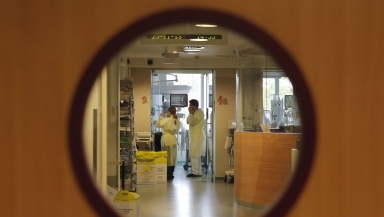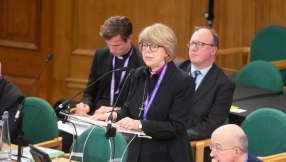
The Government announced on Sunday that it will be giving MPs and Peers a free vote on the Assisted Dying bill proposed by Labour's former Lord Chancellor, Lord Falconer.
The bill would provide legal protection from prosecution if two doctors both agreed to prescribe a lethal dose of drugs to terminally ill patient who they believe has less than six months to live.
A spokesperson for the Ministry of Justice was quoted in the Independent as saying: "The Government believes that any change to the law in this emotive and contentious area is an issue of individual conscience and a matter for Parliament to decide rather than government policy."
Under the 1961 Suicide Act it is still a criminal offence to help someone take their own life, with a maximum sentence of 14 years in prison.
However 2010 guidelines issued by the then Director of Public Prosecutions, Sir Keir Starmer QC, stated that those who assisted a loved one to die while acting out of compassion would be unlikely to face prosecution.
This change in the guidelines emerged after Debbie Purdy, a terminally ill woman, fought and won a case that required the DPP to clarify whether her husband would be convicted for accompanying her to the Dignitas euthanasia clinic in Switzerland.
Since that case, approximately 90 cases of this kind have been investigated and none of them have resulted in prosecutions.
The Assisted Dying bill, a private member's bill put forward in the House of Lords, is still in early stages, with a second reading still not yet scheduled.
However Parliamentary observers have been reported as saying that they believe 30 per cent of MPs will back the bill, while 40 per cent remain undecided.
Richard Ottaway, the Tory MP for Croydon South who arranged a debate in the House of Commons on assisted suicide in 2012, said in The Telegraph that it was clear that support was building.
"Since the assisted suicide debate 18 months ago I have been struck by the number of colleagues who were uncertain then and are now making quite positive noises which leads me to conclude that support for the measure is growing," he said.
Opinion polls suggest that up to 75 per cent of the population would support a change in the law in favour of assisted suicide.
Paul Blomfield, Labour MP for Sheffield Central, who also supports the change, said in The Telegraph: "I certainly welcome the news that the Government are not going to block legislation because I think it is time that Parliament reflected public opinion on this issue."
Norman Lamb, the Liberal Democrat Care Minister said he will vote in support of the bill to end the present system, which he said in the Independent was "cruel" because "people, acting out of compassion for a loved one who is dying, are left uncertain as to whether they will face prosecution".
"The state should not stand in the way" of those looking to end a loved one's suffering, he said in the newspaper.
But other Parliamentary figures are more cautious. In December, Baroness Butler-Sloss, one of the country's most senior judges was quoted by the Daily Mail as saying: "The law rests on the principle that we do not involve ourselves in deliberately bringing about the deaths of others.
"Once we start making exceptions based on arbitrary criteria like terminal illness, that frontier becomes just a line in the sand, easily crossed and hard to defend."
David Cameron and Nick Clegg have also spoken out against assisted suicide previously.
Although a number of high profile cases have drawn the public's attention to the issue in recent years, very few of these cases would be covered by Lord Falconer's bill.
Tony Nicklinson, a sufferer of 'locked-in' syndrome, lost his case for an assisted death in the High Court 2012. As he was not terminally ill, Lord Falconer's bill would not have applied.
The same principle would prevent the law from being applied to noted fantasy author Terry Pratchett, who since being diagnosed with Alzheimer's disease in 2007 has become a vocal pro-euthanasia campaigner. He was quoted in the Daily Mail as saying: "I live in hope I can jump before I am pushed."
Anti-euthanasia campaigners have been vocal in their opposition to Lord Falconer's bill, and have been deeply critical of the government's decision to permit a free vote.
A spokesman for the campaign group Care Not Killing said in a statement it was "disappointing" the Government was not more actively opposing the bill.
"Various attempts to change the law on assisted suicide and euthanasia have been debated and rejected by Parliament in recent years," he said.
The spokesman added that the debate should not be about ending people's lives but about ensuring equal access to good quality medical care and life-saving drugs.













